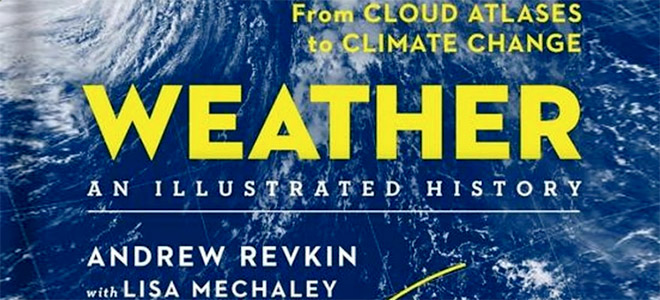
A book talk by Andrew Revkin, co-author of
Weather: An Illustrated History: From Cloud Atlases to Climate Change
June 26, 2018
5:00 – 6:00 PM, CIRES Auditorium
The engaging, illustrated book traces the history of humanity’s evolving relationship with Earth’s dynamic climate system and the wondrous weather it generates. Revkin—the strategic advisor for environmental and science journalism at the National Geographic Society—wrote it with Lisa Mechaley, an educator at the Children’s Environmental Literacy Foundation.
Their book hopscotches through 100 meteorological milestones and insights, from prehistory to today’s headlines and tomorrow’s forecasts. Bite-sized narratives, accompanied by exciting illustrations, touch on such varied topics as Earth’s first atmosphere, the physics of rainbows, the deadliest hailstorm, Groundhog Day, the invention of air conditioning, London’s Great Smog, the Year Without Summer, our increasingly strong hurricanes, and the Paris Agreement on climate change.
Andrew Revkin will be available for questions after the talk; the book will be available for purchase (cash or credit card).
More about the co-author:
Andrew Revkin is one of America’s most honored and experienced journalists and authors focused on environmental and human sustainability and efforts to use new communication tools to foster progress on a finite, fast-forward planet. In the spring of 2018, he joined the staff of the National Geographic Society as strategic adviser for environmental and science journalism. There he is helping expand the Society’s funding and support system for journalism and storytelling that can advance the human journey and conserve biological diversity in a century of momentous global change and challenges. “Weather: An Illustrated History,” written with the environmental educator Lisa Mechaley, is his fourth book.
He has written on global environmental change and risk for more than 30 years, reporting from the North Pole to the White House, the Amazon rain forest to the Vatican — mostly for The New York Times. From 2016 through early 2018, he was the senior reporter for climate change at the nonprofit investigative newsroom ProPublica. From 2010 through 2016 he wrote his award-winning Dot Earth blog for The New York Times Opinion section and was the Senior Fellow for Environmental Understanding at Pace University. There, he developed and taught a graduate course called “Blogging a Better Planet” and co-created an award-winning field course on environmental filmmaking.
He was a staff reporter at The Times from 1995 through 2009, covering issues ranging from threats to New York City’s water supply to the devastating Indian Ocean tsunami and, of course, climate science and policy. In the mid 2000s, he exposed political suppression of climate findings at NASA and editing of federal climate reports by political appointees with ties to the petroleum industry. He made three Arctic reporting trips and was the first Times reporter to file stories, video and photos from the sea ice around the North Pole.
Revkin began reporting on climate change in the 1980s in magazines and never stopped. He has won the top awards in science journalism multiple times, along with a Guggenheim Fellowship and Investigative Reporters & Editors Award. He has written acclaimed and award-winning books on the history of humanity’s relationship with weather, the changing Arctic, global warming and the assault on the Amazon rain forest, as well as three book chapters on science communication.
Revkin has crossed over into scientific scholarship. He played an early role in the evolution of the hypothesis that humans have triggered a new geological epoch, the Anthropocene. In his 1992 climate book, he wrote: “Perhaps earth scientists of the future will name this new post-Holocene period for its causative element—for us. We are entering an age that might someday be referred to as, say, the Anthrocene [sic]. After all, it is a geological age of our own making.” That future arrived just eight years later, in 2000, when scientists formally proposed such an epoch. Revkin was invited to join the Anthropocene Working Group and served from 2011 through 2016. He is a co-author on a series of related peer-reviewed papers.
He speaks frequently about environmental science and policy and sustainability challenges. Drawing on his experience with his Dot Earth blog, which Time Magazine named one of the Web’s top 25 blogs in 2013, Revkin also speaks about the future of environmental journalism and opportunities and pitfalls in navigating the fast-changing online communication climate.
He is also a performing songwriter and leads a Hudson Valley roots band, Breakneck Ridge Revue. He was a longtime accompanist of Pete Seeger and released his first album of original songs in 2013. Two films have been based on his work: “Rock Star” (Warner Brothers, 2001) and “The Burning Season” (HBO, 1994).He lives in the Hudson Valley with his wife, Lisa Mechaley, an environmental educator (and, as of 2018, co-author).

